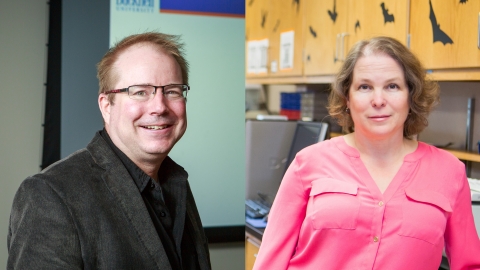
Bucknell Awarded NSF Grant to Study Bat Tolerance to Coronaviruses
June 23, 2020
Bat biologists and professors Ken Field and DeeAnn Reeder. Photos by Brett Simpson
Scientists have identified bat coronaviruses (CoVs) that are closely related to the pathogen underlying the worldwide COVID-19 pandemic. Bat biologists like Bucknell University professors Ken Field and DeeAnn Reeder, biology, know that bats have a long history with coronaviruses, and yet the bats have developed a tolerance to the immune health consequences experienced by other infected living creatures, including humans.
Now through a $200,000 National Science Foundation (NSF) grant, Field and Reeder plan to analyze bat tissue samples archived at Bucknell to learn how bats have become so tolerant to coronaviruses. Their findings may contribute to a more effective human treatment for coronavirus infections in the future.
"Using the same cutting-edge approaches that are helping scientists understand COVID-19 in humans, we will see whether bats might be able to tell us the secret of tolerating coronavirus infections," Field says.
"In simple terms, if you want to understand how to effectively combat and survive a coronavirus infection, ask a bat — they've been doing it for thousands of years," Reeder adds.
Field and Reeder responded to an NSF request for rapid grant proposals for research "that can be used immediately to explore how to model and understand the spread of COVID-19, to inform and educate about the science of virus transmission and prevention." They were quickly approved for the funding.
Bucknell researchers, including at least two Bucknell undergraduate students, will deploy next-generation genomic sequencing on 240 existing bat tissue samples from the African little epauletted fruit bat (Epomophorus labiatus) and the North American little brown bat (Myotis lucifugus) collected through Bucknell research efforts over the past 10 years. They'll compare how the bats respond to different types of CoV infections, comparing the bat responses to those in humans and other novel hosts.
"This research will increase our knowledge of the bat immune system and of coronaviruses," says Joanna Shisler, a program director in NSF's Division of Integrative Organismal Systems. "This knowledge may also aid in developing therapeutics or vaccines against coronaviruses in humans and in wild animals."
Field says their analysis will look specifically at anti-inflammatory genes in bats and compare them to those in novel hosts — like humans — to find out why the bat inflammation genes are not activated during CoV infection, producing an immune response that does not include respiratory distress.
"This research possibly has applications in treatments for patients that already have the infection," Field says. "If we can identify gene pathways that have already been turned off in bats, a drug could be found to turn off those pathways in humans who are infected. It also will help us understand what's going on in COVID-19 and what's causing that damage from the pathogens."
Reeder emphasizes that they are not bringing COVID-19 to their campus lab.
"We are not working with the COVID-19 virus," she says. "Rather, we are taking advantage of the fact that bats naturally carry some types of coronaviruses, so we are analyzing the coronaviruses found in these two species and the immune responses they have developed to them."
Beyond its research aims, the project will train Bucknell's young scientists in disease ecology and bioinformatics. Bucknell students in Field's course "Advanced Data Analysis and Bioinformatics" and in Reeder's course "Wildlife and Emerging Infectious Diseases" will use data generated by the project to explore the biological underpinnings of zoonoses, diseases that spillover from wildlife to people.
"The students in my class are going to use bioinformatics tools to identify viruses found in these samples and the amount of each specific virus," Field says. "They'll also do the analysis to decide how the bat is responding to the infection. We'll be using cutting-edge bioinformatics tools on a real dataset, and that's a great opportunity for our students to work on a real-world problem."
"The NSF was really excited about what we will teach through this project and how this would be used for training young scientists," Reeder adds. "The way we mentor undergrads in projects like this is why people come to Bucknell."
The Bucknell professors are optimistic that they can complete their research by next summer.